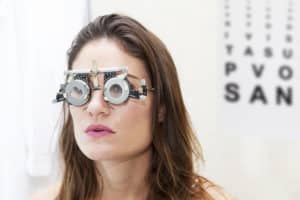What Does 20/20 Vision Mean?

When it comes to our eyes, everyone wants 20/20 vision. But what does that mean? Your Mom probably told you to eat your carrots so that you’d have perfect vision. Is that 20/20?
Since we’re all about the best vision possible at Central Valley Eye Medical Group, let’s give you the lowdown on “20/20” vision.
20/20 defined
The American Optometric Association defines the term, saying it is “used to express normal visual acuity (the clarity or sharpness of vision) measured at a distance of 20 feet.” People with 20/20 vision can see objects, type, etc. that should normally be seen at that distance. The back number is the one that counts. So, if your vision is 20/100, you need to be at 20 feet to see what a person with 20/20 vision can see at 100 feet.
Doesn’t necessarily mean “perfect.”
But don’t be fooled into thinking the 20/20 moniker means the person has perfect vision. Not necessarily. 20/20 is only an indicator of sharpness or vision clarity at a distance. It doesn’t take into account other important factors of vision — peripheral awareness (otherwise known as side vision), eye coordination, depth perception, focusing ability, and color vision. A person could have 20/20 eyesight but be colorblind.
A farsighted person may be able to see the eye chart just fine. But ask that person to read the scorecard after a round of golf, and he’ll be reaching for his reading glasses. Similarly, the person may be able to see from a distance but is unable to focus properly up close (presbyopia).
Plus, no matter what your prescription, be it 20/20, 20/60, or 20/400, you need to maintain the practice of regularly visiting the professionals at Central Valley Eye Medical Group. Why? Things like glaucoma and macular degeneration are evil in that they don’t often show symptoms until about the time they are going to damage your vision permanently. But the team at Central Valley can spot this stuff waaaaaaaay before that happens.
You’re overdue for your annual eye exam, aren’t you? Give us a call at Central Valley Eye Medical Group, (800) 244-9907, to make your appointment.
Posted in: Eye Care, Eye Health

